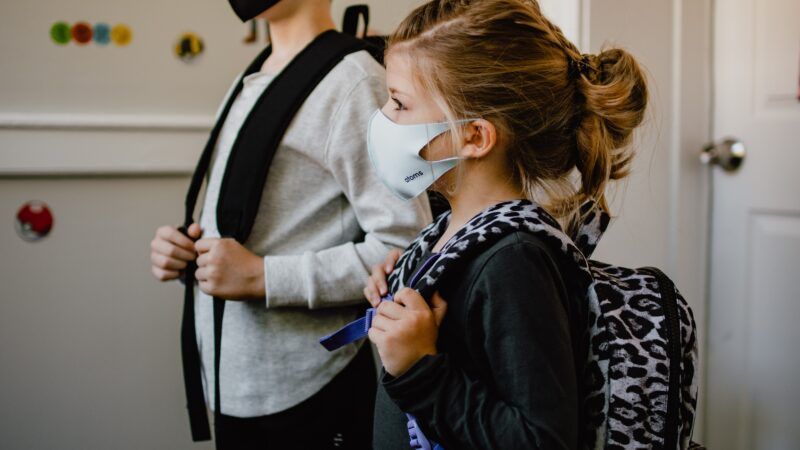The CDC Thinks 2-Year-Olds Should Wear Masks in Schools, Even If Everyone Else Is Vaccinated
The CDC's new guidance for child care facilities is practically begging to be ignored.

The nation's top health officials think day care providers should continue requiring children as young as two years old to wear masks at all times—except while eating and napping—and that will remain the case even after all teachers and staff are vaccinated.
"Even after child care providers and staff are vaccinated, there will be a need to continue prevention measures for the foreseeable future including wearing masks, physical distancing, and other important prevention strategies outlined in this guidance document," noted the Centers for Disease Control and Prevention (CDC) in guidance that was updated on Friday.
The new recommendations emphasize that vaccination will offer important protection for child care workers. "I strongly encourage America's childcare workers to get vaccinated," said CDC Director Rochelle Walensky.
But the comprehensive protection offered by the vaccines—which are all nearly 100 percent effective at reducing severe disease and death—will not mean that daycare providers can ease up on other mitigation efforts, according to the CDC.
The new guidance makes plenty of benign recommendations. Both kids and their teachers should stay home if they feel sick, or if they have had very close contact with someone who tested positive for COVID-19. Children should be taught to cover their mouths and noses when they sneeze, and wash their hands frequently. These are all common sense procedures that would improve the health and safety of any classroom, even if the pandemic was not a factor at all.
But other recommendations are impractical for teachers to implement, taxing on the kids, and absurdly cautious given just how miraculously effective the vaccines are.
The guidance stresses that masks should be worn at virtually all times, even by very young kids, in addition to social distancing. It also emphasizes frequent cleaning of high-touch surfaces, even though surface-to-surface transmission is thought to be a relatively rare method of spreading COVID-19.
In fact, the CDC would prefer if kids simply didn't touch things at all—especially if they are difficult to clean. Day care providers are encouraged to keep each kid's toys separate; the fewer people touching each item, the better.
This even holds true for the outdoors, even though COVID-19 is thought to spread much less easily under such circumstances. (There has never been a confirmed outdoors-only superspreader event.) The CDC's guidance says that while jungle gyms, swingsets, and tricycles "are important for healthy child development," they nevertheless "pose a risk for spreading COVID-19." Health officials recommend getting rid of play spaces that allow kids to interact closely, and also separating the kids into smaller groups—with fences if necessary.
"Stagger your use of playgrounds and play spaces by reducing the group size in the play area at one time or remaining in cohorted groups while sanitizing shared objects and high touch surfaces between groups," says the CDC. "If multiple cohort groups need to be in your play area at the same time, consider using fencing or another barrier to designate separate areas for each cohort."
And in case it wasn't clear, those kids should be masked, even while outdoors.
This guidance is simply not grappling with the fact that the vaccines appear to reduce COVID-19 deaths to a number approaching zero. And while it's true that kids will not be vaccinated any time soon—the vaccines are not approved for the under-16 crowd—they are thankfully, overwhelmingly spared from negative health outcomes associated with the virus. In the U.S., fewer than 300 kids and teenagers have died of COVID-19. For this age group, the deadly disease really is no worse than the flu.
If all the adults in a given child care setting are vaccinated, the danger is eliminated almost entirely, and the argument for forcing kids to keep putting up with all of these frustrating restrictions is not compelling. The CDC is asserting that 2-year-olds should remain sad, lonely, and masked, for no good reason.
The proper response is to ignore the CDC en masse. People who are vaccinated should feel free to resume normal activities, particularly if these activities only involve other people who are also protected from the worst effects of COVID-19—either because they are vaccinated, or because they are young. We don't need to wait until the vaccine is available to kids—something that won't happen until much later this year, or early next—to start letting them enjoy normal childhoods again.


Show Comments (151)